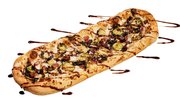Blog
More steps to gluten free
November 16, 2010 by Betsy Craig — pres, menutrinfo.com
Last week, I started this discussion identifying items that contain gluten that might suprise you, as well as the first steps in creating gluten free dishes.
In addition to identifying and eliminating ingredients which contain gluten from recipes, there are several more steps to take to create a truly gluten free dish. In a busy kitchen, gluten can find its way into a dish through cross contamination with other dishes, ingredients, and even utensils.
Follow these steps to avoid cross contamination:
• Always use a separate flour sifter for gluten free flours. Make sure it is clearly marked and stored separately from sifters used for traditional flours.
• Purchase, label, and use separate utensils for the preparation of gluten free dishes.
• Never double dip knives in condiments such as mayonnaise, mustard, and other spreads. Encourage staff to pour spreads into a separate dish before each use.
• Purchase a separate gluten free toaster for toasting gluten free breads, bagels and rolls. Label and place the toaster in a location separate from areas where traditional breads and starches are being prepared to prevent cross contamination.
Gluten sensitivities, allergies, and Celiac disease are becoming more commonplace every day. Being prepared to serve the needs of customers with special dietary concerns is no longer optional for restaurants, it is a necessity.
The single most effective tool to be prepared is to be informed! Having a complete nutrition analysis of all menu-item ingredients and having that information on hand (and easily available!) is key!
About Betsy Craig
To date MenuTrinfo is responsible for menu nutritional information at over 100K US restaurants, food allergy and gluten free ANAB accredited training for hundreds of thousands of food service professionals. AllerTrain is the chosen food allergy training by NEHA providing continuing educational credit hours for those that take and pass its course. Finally, MenuTrinfo delivers food allergy confidence and allergen transparency to today’s food allergic consumer through its onsite division offerings, AllerCheck, Certified Free From allergens for spaces and food products which is an ISO 17065 certification and expert consultation and incident response support when needed.
 ChatGPT
ChatGPT Grok
Grok Perplexity
Perplexity Claude
Claude












